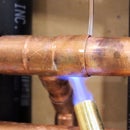Introduction: The BEST Way to SAFELY Change Your Tires
Welcome back to another back to basics article. In this sequel I’ll thoroughly explain how to safely remove and reinstall a wheel for maintenance work on your vehicle or just a simple tire change.
Step 1: THE STEPS
There are 4 easy steps to change or replace a wheel.
Step 1 is to secure your vehicle before lifting it. Safety is number 1 priority, you wouldn’t want your vehicle to roll down a slope and injure someone so this step needs to be followed carefully.
Step 2 is the actual lifting process. You’ll need to lift your vehicle up just enough to get your wheel off the ground in order to remove it.
Step 3 removing and reinstalling your wheel. I’ll be showing you several different methods on how to remove your wheel and reinstall it effortlessly.
Step 4 which is the final step, lowering your vehicle back down.
Step 2: TOOLS/MATERIALS FOR THE PROJECT
Ok, so the first things I’d like to go thru are the tools and materials you’ll be needing to get the job done. The first tool you’ll need is a jack. Every vehicle has its own dedicated jack, but if for whatever reason yours is missing, I suggest using this type of jack. Get one that is more than able to support the weight or your vehicle. I‘m no “safety sally” but getting squashed under a car is something no one wishes for. Most sedans and light trucks nowadays weight in at around 4000lbs or 1800 kilos and seeing 1 ton is equal to 2200lb or 1000 kilos, you’ll be needing a minimum of 2 tons.
You’ll be needing some jack stands as well. Without these you’d be relying only on your jack which isn’t really safe, that’s why you’ll wanna have at least 1 handy. Also, have some wheel chucks handy, you'll be needing them.
Next up is are the different tools that could be used to remove and reinstall your wheel.
If you want to keep things on a budget, I suggest using a long breaker bar. You could get these on special for 25$ Canadian and they do the job just fine but require a little elbow grease compared to the next tool, the air impact gun. The pneumatic impact gun is what’s typically used in a home installation since air compressors are readily available to any homeowner. This method is quick, effortless and inexpensive. A good air gun/compressor combo could set you back around 200$ if you buying used so this could be a good choice. And finally, my favorite of them all, the cordless impact. These guns pack a punch and have no wire, they run off of batteries but cost close to 500$ so go ahead and choose what’s best for you.
And the last tool is a torque wrench. A torque wrench is important seeing you want your nuts and bolts torqued to spec. If you aren’t sure about your vehicle’s torque specs, check your owner’s manual, they often list the more common ones such as wheels, brakes etc...
Step 3: SECURING THE VEHICLE
The first thing you’ll wanna do is chuck the 2 wheels you won’t be working on. You can either use some store bought chucks or you can use some masonry bricks or whatnot and get the same results. Something else that’s very important and that’ll keep your car from moving is your e-brake so make sure it’s set as well as the transmission on PARK for an automatic car and 1st gear for a standard car.
Step 4: LIFTING THE VEHICLE
Next, you’ll need to find a jack point on your vehicle. Since I have a light duty truck with a lot of suspension travel, I will use the lower control arm as a jacking point since it lifts both the body of the truck and the suspension saving a lot of time and energy. If you have a smaller vehicle like a sedan, you can very well use this as a jack point if suspension travel isn’t an issue for you.
Once your vehicle is ready to be lifted, go ahead and lift it slowly just enough so the tires aren’t bearing the weight of the car. Reason being is that to be able to undo the lug nuts on your non-driven wheels without them spinning, they must be in contact with the ground.
Step 5: REMOVING YOUR WHEEL
So go ahead and break them loose one by one, always remember, lefty-loosey, righty-tighty! If all you have with you is a factory tire wrench to get your lug nuts undone, grab a steel bar and use it as a mechanical advantage to help you out.
Now that your lugs are loose, continue lifting the vehicle till the tire comes off the ground, install your jack stand(s) and move on to removing the lugs nuts completely. If you tire is stubborn and doesn’t seem to wanna come off, here are a couple of tricks that might work out for you. Trick number 1 is kicking the front of the tire, trick number 2 is hitting the back side of the tire with a sledgehammer and if none of the above work, Snug up your lug nuts just enough so your wheel doesn’t wobble, remove your jack stand/wheel and use a curb as an elevation and simply drive off of it purposely, this trick uses the weight of the vehicle to break your wheel loose.
As an added protection, use the tire you just removed under your vehicle as a stopper, if any does happen, you’ll be protected.
Step 6: INSTALLING YOUR WHEEL
With your wheel on, and ready to be tightened, the general rule of thumb I follow is 100foot-lbs for every vehicle ranging from sedans to light-duty pickups to SUVs. 100lbs is enough for it not to undo when driving and just enough for it not to be too hard when undoing in the event of a flat tire. Although this works for me, I do suggest you check your owner’s manual just to be sure you wheel gets the right torque spec.
So go ahead and tighten these in a star formation. If your wheel starts to turn, remove the wheel you placed earlier from under the vehicle and lower it till the tire touches the ground. Now that it’s blocked, proceed to torquing your lugs.
Step 7: LOWERING YOUR VEHICLE
Once you are finished, make sure nothing is left under the vehicle including the wheel we left under as a protection, and slowly lower it till you are able to remove the jack and don’t forget to remove you wheel chucks, and you’re done!
That was how to safely remove your wheel for either maintenance work or an unfortunate flat tire.





